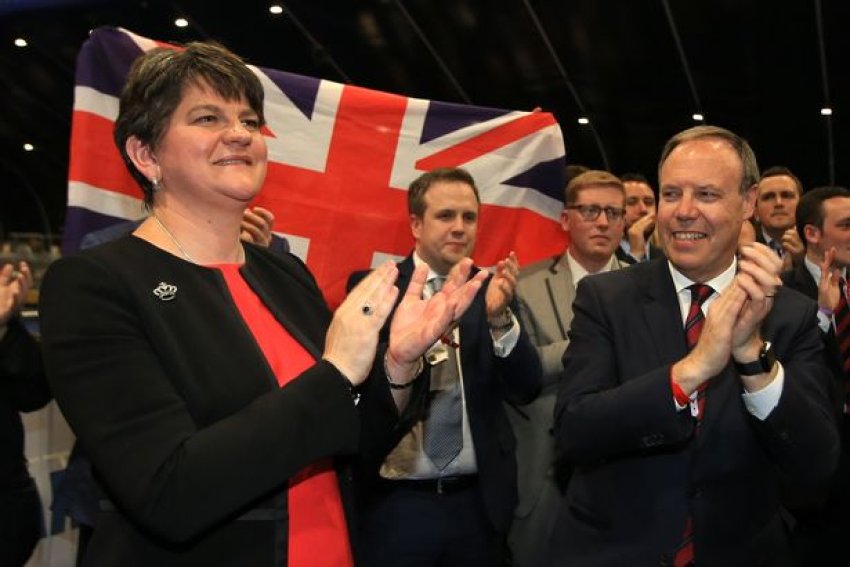
In Northern Ireland — the partitioned statelet made up of the six Irish counties still claimed by Britain — the Democratic Unionist Party (DUP) is the largest unionist party (supporters of an ongoing “union” with Britain).
However, little attention was paid to the party in Britain until a deal was struck by Britain’s Conservative Party to form a minority government with DUP support, writes Denis Burke in a piece abridged from Red Pepper.
***
Imagine you met someone from France who had never heard of Margaret Thatcher. Think how surreal it would be if someone from such a short distance away had missed one of the most polarising and consequential phenomena on your island in living memory.
That’s what it was like on June 9, the day after the British general elections, for people from Ireland to discover that most of Britain knew next to nothing about the Democratic Unionist Party.
Hastily prepared memes flew around social media. News outlets ran endless “Who are the DUP?” articles. The Huffington Post described them as a “fairly unknown” party.
Whether you come from Northern Ireland or the Republic of Ireland, and regardless of your religion or politics, you have heard of the DUP — and not because they are socially conservative.
In recent weeks, much has rightly been made of the DUP’s climate denialism, anti-choice stance, opposition to marriage equality and rejection of cosmopolitan values.
Supporters of Jeremy Corbyn gleefully pointed to Tory hypocrisy. Having spent the election campaign lambasting Corbyn for allegedly sympathising with terrorists, the Tories opportunistically courted the support of a party whose membership once overlapped with several pro-British loyalist paramilitary groups.
Until recently, what made the DUP so infamous on the island of Ireland was little to do with social conservatism. The party’s passionate dedication to Britishness (albeit a form of Britishness more honoured in Gibraltar and the Falkland Islands than anywhere in Britain itself), their defence of Ulster Protestantism or their celebration of Unionist culture and tradition are not what made their reputation either.
Rather, the DUP stands out for their historic and often dogmatic lack of compromise, including in negotiations with the British government.
‘Ulster says no’
It is no coincidence that the DUP slogan “Ulster says no” has been parodied so often. For the first 30 years, the DUP rarely felt compelled to offer constructive solutions.
Even other unionists characterised the DUP as deeply negative. The party rejected many and varied attempts to resolve the violence in Northern Ireland.
They rejected proposals that involved sharing power with republicans. They protested any involvement of the government of the Republican of Ireland in Northern Ireland’s affairs.
They campaigned against the attempts to negotiate a peaceful resolution to the conflict in the Sunningdale Agreement, the Anglo-Irish Agreement, and the Belfast Agreement (better known as the Good Friday Agreement).
By insisting on majority rule and opposing power sharing, the DUP guaranteed Northern Ireland’s Catholic minority would remain largely excluded from political life.
The DUP carried the torch for an anachronistic form of loyalist fundamentalism that saw any accommodation of the Catholic population or the Republic of Ireland as a surrender to “papism” and a threat to the union.
In time, their persistence would drastically shift mainstream unionism, eventually unseating the Ulster Unionist Party as the largest party in Northern Ireland.
Ian Paisley, a fundamentalist Presbyterian minister and unionist hardliner, established the DUP in 1971. He led the party for the next 37 years, bringing them from the fringes to the mainstream.
The DUP was originally a response to the civil rights movement that developed in the late 1960s. This movement campaigned to end social, employment, education and housing discrimination against Northern Ireland’s Catholic population. Paisley characterised the civil rights movement as republicanism in disguise.
Little attention
The DUP was the only major party in Northern Ireland to campaign against the Good Friday Agreement — the 1998 agreement that ushered in the past two decades of relative peace and prosperity.
After the Good Friday Agreement, elections to Northern Ireland’s new Assembly were originally won by more moderate parties like the UUP and the moderate nationalist Social Democratic Labour Party.
When devolved government returned to Northern Ireland after the 2002-2007 suspension, the DUP came into power with the republican party Sinn Fein. This was remarkable progress — the thought that these two parties could share power would scarcely have been credible even a decade before.
The DUP have normalised, if not moderated in recent years, since even before Paisley stepped down as leader.
The time has indeed come to pay more attention to current affairs, such as their antiquated social policies or their role in the Brexit referendum than to their anti-peace past. But much of Britain only paid attention to the DUP for the first time on June 9. For instance, little was said or considered about the consequences of a leave vote for Northern Ireland ahead of the Brexit referendum.
Opinions are mixed on the impact of Brexit or the Tory-DUP partnership on the Northern Ireland peace process. Northern Ireland’s institutions are not in good shape. They came close to collapse in late 2015 and have veered further into troubled waters this year. Sinn Fein withdrew from Northern Ireland’s executive in protest at various DUP actions, and a solution to the stand-off has yet to be found.
The need for a solution to the issue of Northern Ireland’s border with the Republic after Britain leaves the EU will ensure the North remains high on Britain’s agenda for some time. Attention is evidently badly needed.
But it remains to be seen if British Prime Minister Theresa May is making a mistake by negotiating this agenda with the DUP at her side.